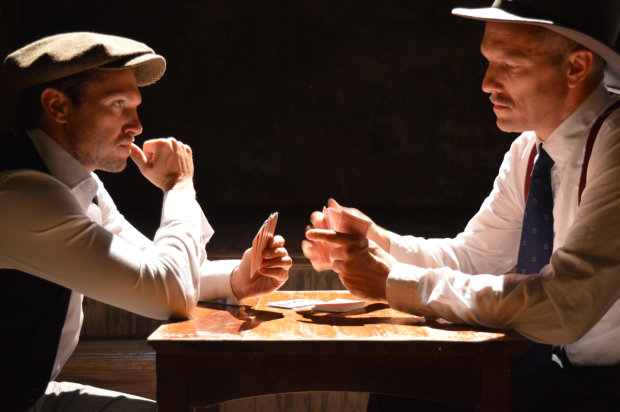The Sting (Wilton’s Music Hall)

This careworn old place has just had a facelift – but nothing’s been overdone, luckily. Here in Wilton’s Music Hall, in the evocative shadowiness, 1930s Chicago does not so much leap into life as splutter into a state of moral deathliness. The jazz fades away; a rush-hour streetful of coughing, shoving persons hasten irritably across the stage, and the joyous depravity of The Sting is underway.
Loyal to the often tortuous plot of the 1973 Oscar-looting film on which it was based, David Rogers‘ play concerns ne’er-do-wells who know a con is always a con, and can only hope to get along by conning other cons. Small-town grifters Hooker (Ross Forder) and Luther dupe a victim out of cash, unaware he’s a runner for the Chicago mob boss Lonnegan (John Chancer) – who orders the murder of Luther in return. Hooker solicits Gondorff (Bob Cryer), a veteran crook, to help him "big con" Lonnegan out of half a million dollars. In a complex game of double-crossing, Hooker is pursued by Lonnegan’s hitman while ingratiating himself with the mobster under a false identity.
As it is eternally with gang dramas, this is all really a question of revenge rather than dollars. The Sting might be ultimately about the Great Depression, but it is also about a great desperation. In an era of economic nullity, respect is golden, and these characters are desperate for it. They make constant bids for legitimacy; director Peter Joucla ensures they remain preposterous. Every single personality is a crook of some order, but they don’t half dress well. In a brief state of ecstasy over his initial cash windfall, Hooker’s first move is to buy back his suit, and preen, while the tutting pawnbroker advises him to "go into garbage – there’s a lot of money in garbage".
Relieving the lengthy passages of exposition – which are obfuscated once or twice by accents which come and go via London’s east end and Australia – these clipped exchanges are the currency in which The Sting deals best. All the stock characters are satisfyingly present and correct, whether unhelpful femmes fatales or pinstriped goons. Film noir motifs weren’t really this established in the 1930s, but The Sting and anachronism go hand in hand: the film version deployed ragtime music at every turn. Mercifully, "The Entertainer" is heard only once, and pianist Ashley Henry also deserves praise for some fizzy renditions of George Gershwin, Irving Berlin, and co. Something’s crackling at Wilton’s, and this time it’s not the wallpaper.
The Sting runs at Wilton’s Music Hall until 17 October.










